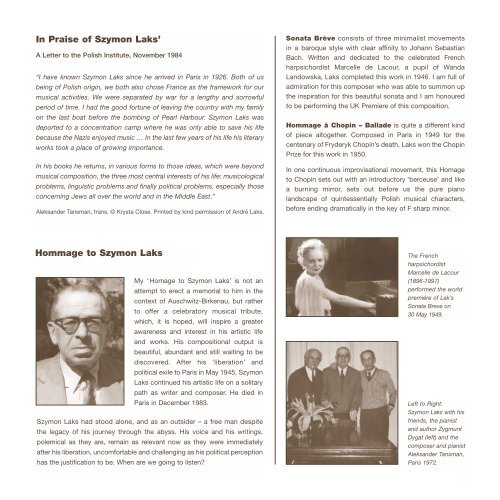Paul Crossley A5 flyer Final - Viktor Ullmann Foundation
Paul Crossley A5 flyer Final - Viktor Ullmann Foundation
Paul Crossley A5 flyer Final - Viktor Ullmann Foundation
Create successful ePaper yourself
Turn your PDF publications into a flip-book with our unique Google optimized e-Paper software.
In Praise of Szymon Laks’<br />
A Letter to the Polish Institute, November 1984<br />
“I have known Szymon Laks since he arrived in Paris in 1926. Both of us<br />
being of Polish origin, we both also chose France as the framework for our<br />
musical activities. We were separated by war for a lengthy and sorrowful<br />
period of time. I had the good fortune of leaving the country with my family<br />
on the last boat before the bombing of Pearl Harbour. Szymon Laks was<br />
deported to a concentration camp where he was only able to save his life<br />
because the Nazis enjoyed music … In the last few years of his life his literary<br />
works took a place of growing importance.<br />
In his books he returns, in various forms to those ideas, which were beyond<br />
musical composition, the three most central interests of his life: musicological<br />
problems, linguistic problems and finally political problems, especially those<br />
concerning Jews all over the world and in the Middle East.”<br />
Aleksander Tansman, trans. © Krysta Close. Printed by kind permission of André Laks.<br />
Sonata Brève consists of three minimalist movements<br />
in a baroque style with clear affinity to Johann Sebastian<br />
Bach. Written and dedicated to the celebrated French<br />
harpsichordist Marcelle de Lacour, a pupil of Wanda<br />
Landowska, Laks completed this work in 1946. I am full of<br />
admiration for this composer who was able to summon up<br />
the inspiration for this beautiful sonata and I am honoured<br />
to be performing the UK Premiere of this composition.<br />
Hommage à Chopin – Ballade is quite a different kind<br />
of piece altogether. Composed in Paris in 1949 for the<br />
centenary of Fryderyk Chopin’s death, Laks won the Chopin<br />
Prize for this work in 1950.<br />
In one continuous improvisational movement, this Homage<br />
to Chopin sets out with an introductory ‘berceuse’ and like<br />
a burning mirror, sets out before us the pure piano<br />
landscape of quintessentially Polish musical characters,<br />
before ending dramatically in the key of F sharp minor.<br />
Hommage to Szymon Laks The French<br />
harpsichordist<br />
Marcelle de Lacour<br />
My ‘ Homage to Szymon Laks’ is not an<br />
(1896-1997)<br />
attempt to erect a memorial to him in the<br />
performed the world<br />
premiére of Lak’s<br />
context of Auschwitz-Birkenau, but rather<br />
Sonata Breve on<br />
to offer a celebratory musical tribute,<br />
30 May 1949.<br />
which, it is hoped, will inspire a greater<br />
awareness and interest in his artistic life<br />
and works. His compositional output is<br />
beautiful, abundant and still waiting to be<br />
discovered. After his ‘liberation’ and<br />
political exile to Paris in May 1945, Szymon<br />
Laks continued his artistic life on a solitary<br />
path as writer and composer. He died in<br />
Paris in December 1983.<br />
Left to Right:<br />
Szymon Laks with his<br />
Szymon Laks had stood alone, and as an outsider – a free man despite<br />
friends, the pianist<br />
and author Zygmunt<br />
the legacy of his journey through the abyss. His voice and his writings,<br />
Dygat (left) and the<br />
polemical as they are, remain as relevant now as they were immediately<br />
composer and pianist<br />
after his liberation, uncomfortable and challenging as his political perception<br />
Aleksander Tansman,<br />
has the justification to be. When are we going to listen?<br />
Paris 1972.<br />
3


